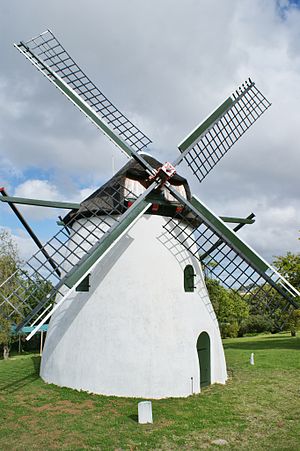Mostert's Mill
| Mostert's Mill | |
|---|---|

Mostert's Mill, September 2012
|
|
| Origin | |
| Mill name | Mostert's Mill |
| Mill location | 33°57′08″S 18°27′58″E / 33.95222°S 18.46611°ECoordinates: 33°57′08″S 18°27′58″E / 33.95222°S 18.46611°E |
| Operator(s) | Friends of Mostert's Mill |
| Year built | c1796 |
| Information | |
| Purpose | Corn mill |
| Type | Tower mill |
| Storeys | Three |
| Number of sails | Four |
| Type of sails | Common sails |
| Windshaft | Wood, with cast iron poll end |
| Winding | Tailpole |
Mostert's Mill (Afrikaans: Mostert se Meul) is a historic windmill in Mowbray, Cape Town, South Africa. It was built in 1796 and is the oldest surviving and only complete windmill in South Africa.
The mill was built around 1796 as a private mill on the farm 'Welgelegen', owned by Gysbert van Renen and was named after his son-in-law, Sybrand Mostert, after Van Renen's death. It was the first privately owned mill in Cape Town. Prior to the British occupation of the Cape in the Battle of Muizenberg in 1795, only mills controlled by the Dutch East India Company were allowed. Mostert's Mill had ceased working by 1873 but was owned by the Mostert family until 1889, when it was sold to a Mr Wilks, who sold it in 1891 to Cecil Rhodes. The mill became derelict but a restoration was undertaked by the Dutch millwright Christiaan Bremer. The restored mill was opened on 1 February 1936 by Dr Lorentz, the Minister Plenipotentiary and Envoy Extraordinary to the Netherlands. The ceremony was attended by the Prime Minister, General Hertzog and flour was ground for the guests.
The mill was worked on occasion but it again became derelict during the Second World War. In 1986, the windshaft broke and the sails crashed to the ground. The Vernacular Architecture Society of South Africa started a campaign to preserve the mill, leading to the formation of the Friends of Mostert's Mill in 1993. A further restoration in 1995 by Dunning-Bremer returned the mill to working order again at a cost of R245,000.
Mostert's Mill is a three storey tower mill. The tower is 7.94 metres (26 ft 1 in) in diameter externally at ground level and is 6.68 metres (21 ft 11 in) high. It is constructed of random stone for the first 2.28 metres (7 ft 6 in) and then unbaked bricks above. The walls are 1.15 metres (3 ft 9 in) thick at ground level, giving the mill an internal diameter of 5.64 metres (18 ft 6 in).
...
Wikipedia
